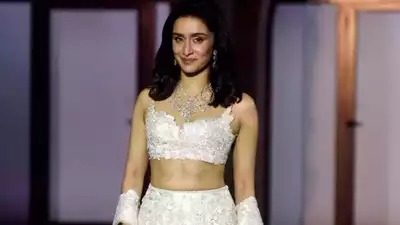In the glamorous world of fashion and entertainment, every appearance by a celebrity is scrutinized, analyzed, and often debated. Recently, Shraddha Kapoor, one of Bollywood’s beloved actresses, made headlines for her ramp walk during a high-profile fashion show. However, rather than receiving universal acclaim, her performance sparked a mix of admiration and criticism across social media platforms. The incident has raised questions about the nature of celebrity appearances, the expectations placed on stars, and the evolving standards of beauty and poise in public spectacles. The event in question was a much-anticipated fashion show featuring renowned designers and models. Shraddha Kapoor was invited to showcase a designer’s collection that drew inspiration from vibrant colors and modern aesthetics. As the lights dimmed and the music began to play, the atmosphere was charged with excitement. Kapoor, dressed in a stunning ensemble, stepped onto the ramp, expecting applause and admiration. However, the reaction was mixed, leading to a cascade of opinions online. Kapoor’s ramp walk was described by many as “awkward.” Observers noted that her movements lacked the fluid grace typically associated with experienced models. Critics pointed out instances where her posture appeared rigid and her steps uncertain. While some believed her smile was genuine, others felt it came off as forced, as if she were trying too hard to project confidence. The contrast between her usual charismatic presence in films and her ramp demeanor led to a broader discussion about the pressures of public appearances. Social media platforms erupted with reactions ranging from supportive to harshly critical. Hashtags like #ShraddhaAwkward began trending as users shared clips and memes, dissecting her performance in real-time. Supporters argued that Kapoor should be celebrated for stepping out of her comfort zone and embracing opportunities beyond traditional acting roles. They noted that modeling is an art that requires a different skill set and that it’s not fair to judge an actress solely on her ability to walk the ramp. Conversely, critics voiced their discontent, suggesting that celebrities should be well-prepared for such high-stakes events, especially when representing prominent brands. Some netizens pointed to the professionalism expected from those in the limelight, arguing that Kapoor’s performance fell short of the mark. This division highlighted the unrealistic standards placed on public figures and the scrutiny they face.
Kapoor’s ramp walk serves as a microcosm of larger societal issues concerning beauty standards, talent, and the nature of celebrity culture. In an era where social media amplifies every moment, the pressure to maintain a perfect image is immense. Celebrities are often held to unattainable standards, with their flaws magnified and discussed widely. This scrutiny can lead to a culture of comparison, where the public’s perception of ‘ideal’ behavior and appearance is heavily influenced by viral moments. Moreover, the incident raises questions about the role of traditional modeling versus acting. While many actors step into the modeling world for promotional events or fashion shows, the skills required for each domain can be vastly different. The ramp demands a certain kind of poise and familiarity with the nuances of walking in front of an audience and cameras, skills that are not necessarily inherent to every actor. On the other hand, the backlash against Kapoor also highlights a growing movement of support for public figures who experience vulnerability. In recent years, many fans have rallied around their favorite celebrities during difficult times, recognizing the immense pressure they face. Advocates for mental health awareness argue that understanding and compassion are essential when critiquing public figures. Supporters of Kapoor emphasized the importance of lifting each other up, acknowledging that everyone has off days and that no one is immune to feeling out of place. This sentiment reflects a broader cultural shift toward kindness and understanding, especially in the face of mistakes or awkward moments. Shraddha Kapoor’s ‘awkward’ ramp walk has become a topic of conversation that transcends the immediate spectacle. It reflects the complexities of celebrity life, the intense scrutiny that comes with fame, and the often unrealistic expectations placed on public figures. In dissecting this incident, it becomes clear that while there is a space for critique, there is also a need for empathy. Kapoor’s experience on the ramp can serve as a reminder that everyone, regardless of their public persona, has moments of discomfort and imperfection. As the conversation continues online, it is essential for fans and critics alike to engage with these moments thoughtfully, fostering a culture that values authenticity over perfection. In an age dominated by social media, every celebrity appearance can either uplift or diminish the discourse around body image, talent, and societal expectations. Kapoor’s walk, while labeled as ‘awkward,’ ultimately provides an opportunity for dialogue about the pressures faced by public figures and the importance of supporting one another through the myriad challenges of life in the spotlight. As we navigate this complex landscape, let’s strive for a balance of critique and compassion, understanding that behind every public moment lies a human experience.

